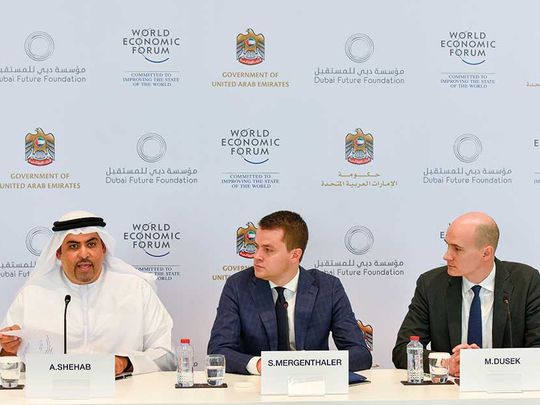
DUBAI: Top global minds will converge on Dubai this weekend to weigh the economic and social impacts of global digital disruption as the World Economic Forum (WEF) gauges rapid technological change.
As any as 700 experts from 50 countries will gather for the WEF second annual meeting of the Global Future Councils November 11-12 to be held at Madinat Jumeirah.
Mohammad Abdullah Al Gergawi, Minister of Cabinet Affairs and the Future of the United Arab Emirates, said the UAE is keen to understand the rapid digital transformation around the world.
“The Fourth Industrial Revolution is already having a profound effect on societies and economies: as we look to build a future for our country and for the world, it is essential that we embrace these forces of transformation and use them in ways that help us emerge stronger and better adept at advancing the interests and well-being of our people,” he said.
“By harnessing relevant forces of change and focusing on the active roles of citizens and younger generation aspirations exciting outcomes of the 4th Industrial Revolution will be realised. The Annual Meeting of the Global Future Councils is about drawing on world-class knowledge and applying it in ways that help us meet these goals.”
Klaus Schwab, Founder and Executive Chairman, World Economic Forum, said ahead of the councils meeting that the Fourth Industrial Revolution will have a “disruptive impact on business models, the economy, society and each individual”. He added that shape a positive outcome of this revolution, the WEF has created the Annual Meeting of the Global Future Councils to convene the foremost global thinkers to accelerate the positive impact of this revolution.
At a press conference on Thursday at the Prime Minister’s Office in Dubai, officials said strategies developed at the gathering will be shared worldwide to help countries meet major change head on.
“We see this as the world’s brainstorm session,” said Stephan Merganthaler, Head of Knowledge Networks and Analysis, Member of the Executive Committee, WEF.
He told reporters that data gathered from the meeting will be curated and made available on a new digital knowledge platform called The WEF Transformation Maps, a repository of data covering more than 100 industries and trends now shaping the globe.
“Bold action to address global challenges requires the understanding, support and mobilisation of all members of society. We hope that by making available the collective intelligence of the Forum’s expert networks — captured in our Transformation Maps — as a public good we can inspire creativity and fresh thinking,” Mergenthaler said.
Atraf Shehab, Director of the Fture Department of the Prime Minister’s Office, added that the UAE was glad to host such a high-calibre meeting of minds. “This is a great opportunity for the UAE to host such an event,” Shehab said, noting that topics expected to dominate this weekend’s discussion will focus on the Fourth Industrial Revolution and its digital elements such as artificial intelligence, robotics, Blockchain and innovation.
Mirek Dusek, Head of Middle East and North Africa for WEF and Member of the Executive Committee, lauded the UAE for its efforts to embrace the digital future by launching its national strategy in September.
Under the theme, The Globalization of Knowledge in a Fractured World, council members will seek solutions and develop ideas to foster international cooperation and shared responses to global challenges.












